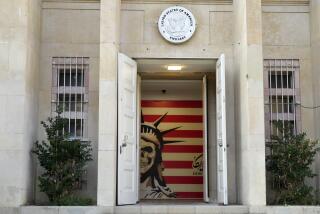Pakistan Coup a Risk for Region
- Share via
For nearly half of its 52-year history Pakistan has been ruled by the army. It now appears the army intends to rule again.
Moving swiftly, the military has ousted the government of Prime Minister Nawaz Sharif, just hours after Sharif announced he was dismissing the powerful army chief of staff. Animosity between the military and the civilian government has grown since last summer when Sharif, at President Clinton’s urging, moved to defuse the latest crisis over Kashmir by ordering army-supported Islamic militants to end their intrusion into Indian- controlled territory.
What many Pakistanis saw as a national humiliation further diminished Sharif’s popularity, already sagging because of a troubled economy and the prime minister’s voracious appetite for power.
Sharif’s firing of army chief Gen. Pervez Musharraf triggered the coup, which for the moment appears to command considerable public support. It is an all too familiar story. But this time the military takeover has implications that extend beyond Pakistan’s borders.
Pakistan, like its rival India, has now tested nuclear devices. That adds exponentially to the risks involved in the confrontation between the two countries--mainly over the disputed province of Kashmir--that dates from their independence from British rule in 1947. It was because last summer’s fighting in Kashmir raised fears of a much larger war, conceivably involving nuclear weapons, that the United States intervened diplomatically to tamp down the crisis. How much leverage Washington has now to put behind the State Department’s call for a rapid restoration of civilian democratic rule is uncertain. The last thing Southwest Asia needs is the threat of further instability. But that’s exactly what Tuesday’s coup has created.
More to Read
Sign up for Essential California
The most important California stories and recommendations in your inbox every morning.
You may occasionally receive promotional content from the Los Angeles Times.













